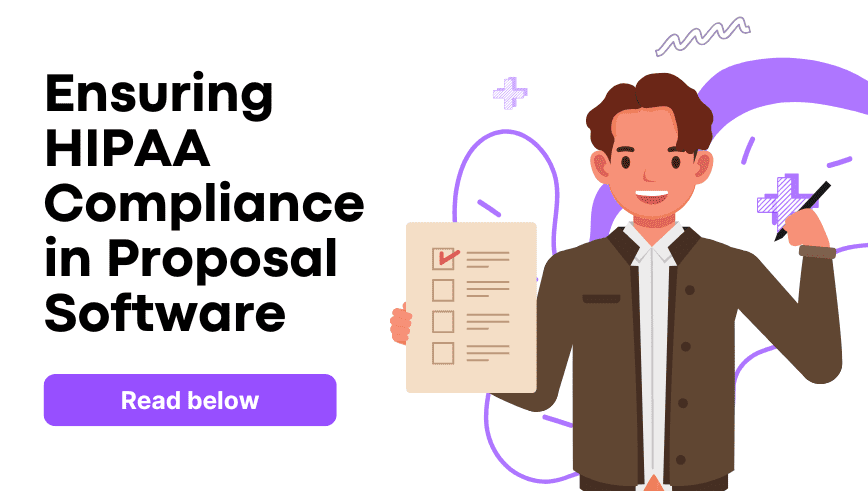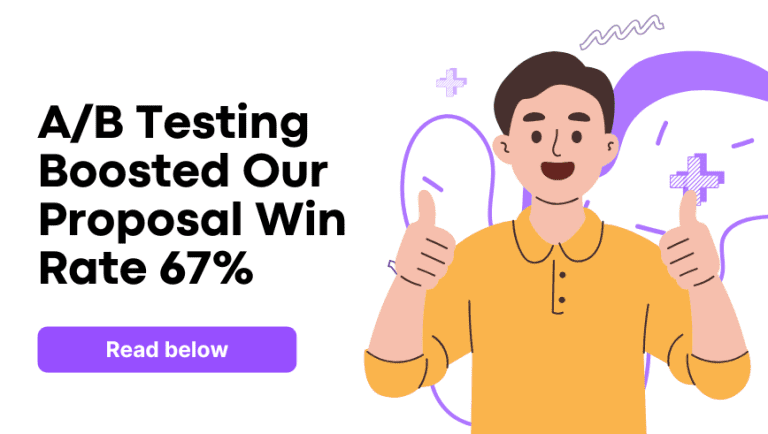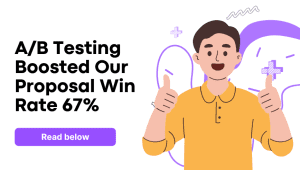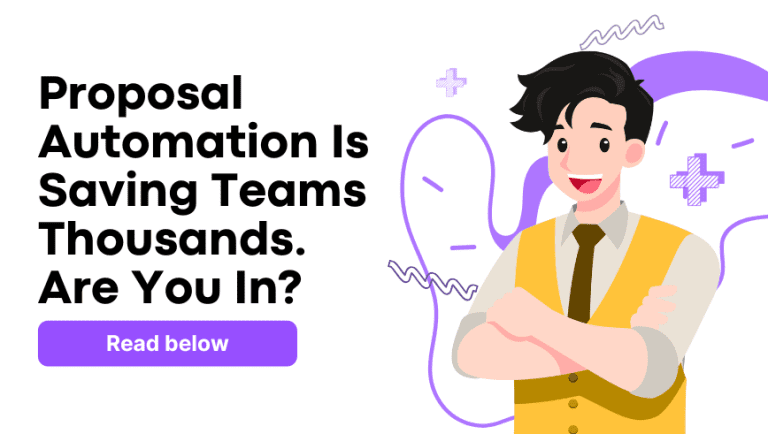You’ve been through it all at this point. Countless meetings, late-night emails, and endless back-and-forth with your team, and finally, you’re ready to send that proposal. You’ve polished every section, double-checked the figures, and made sure the design looks perfect. But then, it hits you: HIPAA compliance. It’s the one thing you know you need to address, yet somehow, it always feels like the last obstacle standing between you and success.
You check your proposal software, and it suddenly becomes clear. The tool you trusted? Not HIPAA-compliant.The one that promised robust security features? Far from meeting the mark.
If this sounds familiar, you know the frustration. The clock is ticking, and compliance should not be something you need to rush at the last minute.
We get it. And that’s why we have compiled this guide to help. We’ll walk you through everything you need to know about HIPAA Compliant Proposal Software, so you can protect sensitive data while handling proposals with confidence.
Why HIPAA Compliant Proposal Software Matters
When you’re working in healthcare contracting or medical devices, compliance is more than just a regulatory formality. It’s a fundamental part of maintaining trust and integrity in your business. Without this, the goodwill of any healthcare institution is under threat. To further emphasise the importance of compliance, the Health Insurance Portability and Accountability Act (HIPAA) governs how sensitive patient data, known as Protected Health Information (PHI), is handled. If your proposal software doesn’t meet these standards, it could mean costly mistakes and not just for your business, but for the patients whose information you’re responsible for.
It’s easy to overlook compliance when you’re focused on creating the perfect proposal. But the stakes are high. Healthcare proposals often include sensitive data, such as patient demographics, treatment plans, and medical records. This data needs to be handled securely, and your software must comply with HIPAA’s requirements to ensure the protection of that information.
What to Look for in HIPAA Compliant Proposal Software
When you’re choosing the right software, it’s about more than just features. You need to ensure that the tool does what it says it does, keeping all your data secure. Here’s a rundown of the features you need to make sure you’re covered:
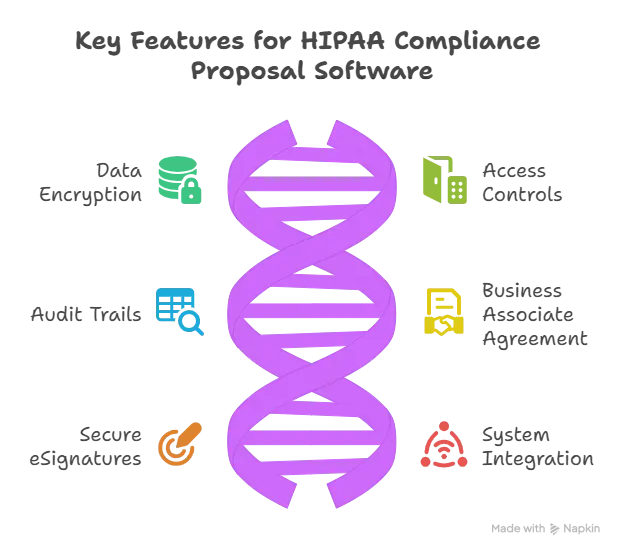
- Data Encryption
Ensure that your data is protected at all times. Look for software that encrypts data at rest and in transit using strong encryption methods, such as AES-256. This protects PHI from unauthorized access. - Access Controls
Protect data by limiting who can access it. Look for software that uses role-based permissions to make sure only authorized people can view or edit PHI. - Audit Trails
Keeping track of every interaction with a document is essential, especially if you need to prove compliance during an audit. A software with audit trails will allow you to see who accessed a document, what changes they made, and when that happened. - Business Associate Agreement (BAA)
A BAA is a contract between you and the vendor, ensuring they follow HIPAA guidelines. Without it, your software might not be fully compliant, leaving you exposed to potential risks. - Secure eSignatures
In healthcare, many proposals will need to be signed. Ensure that your software offers secure, legally binding eSignatures that meet ESIGN and UETA requirements. - Integration with Other Systems
Your software should easily integrate with other tools you use, like EHRs or CRMs. These integrations need to be HIPAA-compliant as well, ensuring the protection of PHI during data transfer.
As you explore the best HIPAA-compliant solutions for your healthcare business, it’s important to choose tools that not only meet compliance requirements but also simplify the process. At Proposal.biz, we understand the unique needs of healthcare providers and contractors. We’re developing a platform designed to make compliance easier by providing features like secure eSignatures, encryption, and seamless integration with other healthcare systems while keeping your data safe and your workflow streamlined. We’re constantly working on improving the platform, so you can focus on delivering high-quality proposals without worrying about compliance issues.
Challenges of HIPAA Compliance in Proposal Management
Achieving HIPAA compliance in proposal management isn’t as straightforward as it seems. Many healthcare organizations face several challenges in implementing secure and compliant systems. Here are some of the most common hurdles:
- Lack of Awareness: Many organizations use proposal software that isn’t designed for healthcare, resulting in unintentional non-compliance. While these tools may have basic security features, they often lack the specific requirements for healthcare data protection.
- Balancing Security and Efficiency: Healthcare organizations are under constant pressure to improve operational efficiency. However, ensuring HIPAA compliance often means adding layers of security and tracking that can slow down processes if not implemented effectively.
- Vendor Risk: When using third-party proposal software, it’s crucial to ensure that the vendor fully understands HIPAA requirements and follows them. Not all vendors are transparent about their security measures, and this can put your organization at risk.
These challenges can make navigating the world of HIPAA-compliant proposal software overwhelming. However, the right software will help mitigate these issues while ensuring that your processes remain efficient and secure.
Evaluating Long-Term Costs of Compliance vs. Non-Compliance
Understanding the financial impact of HIPAA compliance (or the lack thereof) is crucial. While investing in HIPAA Compliant Proposal Software may seem like a significant expense up front, it’s nothing compared to the long-term costs of non-compliance.
Non-compliance can lead to hefty fines, with penalties ranging from $100 to $50,000 per violation, up to a maximum of $1.5 million annually. That’s not to mention the potential legal fees, lawsuits, and reputational damage your organization could face.
Investing in compliant software may also save you money in other ways. With the right tools, your proposal and contract processes become more streamlined, reducing overhead and improving your overall workflow. So, the real cost of non-compliance is far more than just the fines that are an issue. At this point, it’s the risk to your entire business that is in spotlight.
4 Best HIPAA Compliant Proposal Software
So, how do you go about selecting the right tool? Here are some of the top options available for healthcare contractors that ensure compliance while making your job easier:
PandaDoc
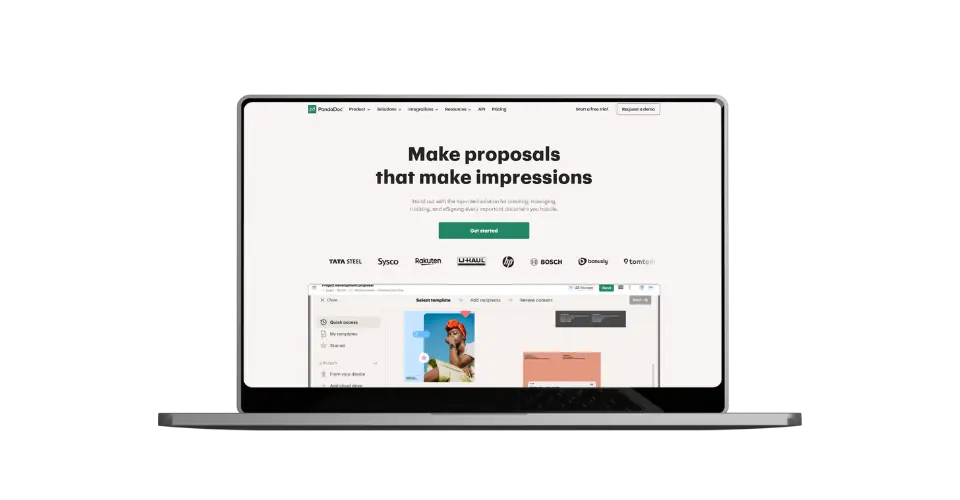
Type: Proposal Software
Key Features: Custom templates, eSignatures, workflow automation
HIPAA Compliance: PandaDoc provides a BAA, AES-256 encryption, and SOC 2 Type II certification.
Pricing: Essentials: $19/month; Business: $49/month (annual)
Best For: Healthcare contractors who need a complete proposal creation solution with secure eSignatures and automation.
PandaDoc is a strong choice for healthcare contractors, providing a comprehensive solution for proposal creation and signing. It integrates with CRMs and offers top-notch security features, ensuring compliance with HIPAA.
ContractLogix
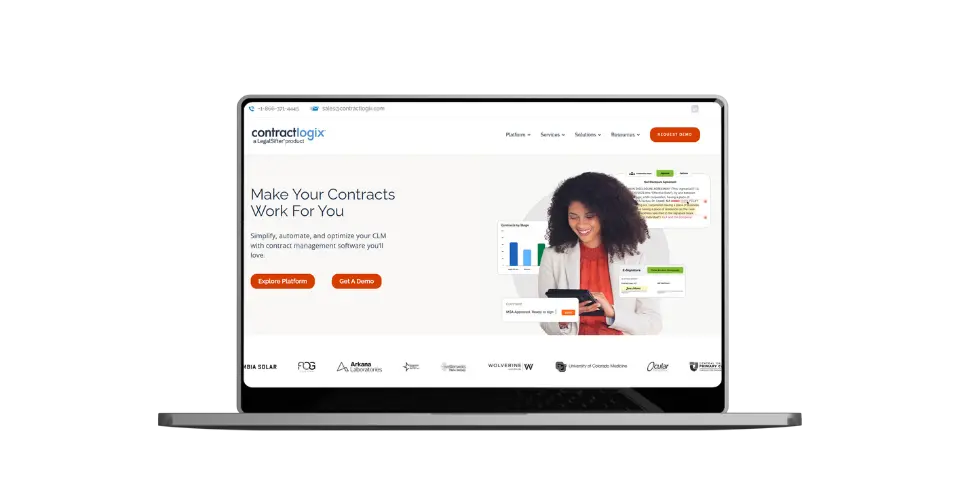
Type: Contract Management Software
Key Features: HIPAA-compliant templates, automation, audit trails
HIPAA Compliance: Fully compliant with SOC 2 Type II and HIPAA regulations.
Pricing: Custom pricing
Best For: Healthcare providers looking to manage contracts stemming from proposals.
ContractLogix focuses more on managing the contracts that result from proposals. Its HIPAA-compliant features make it an excellent choice for healthcare providers who need to ensure the security of these critical documents.
ContractSafe
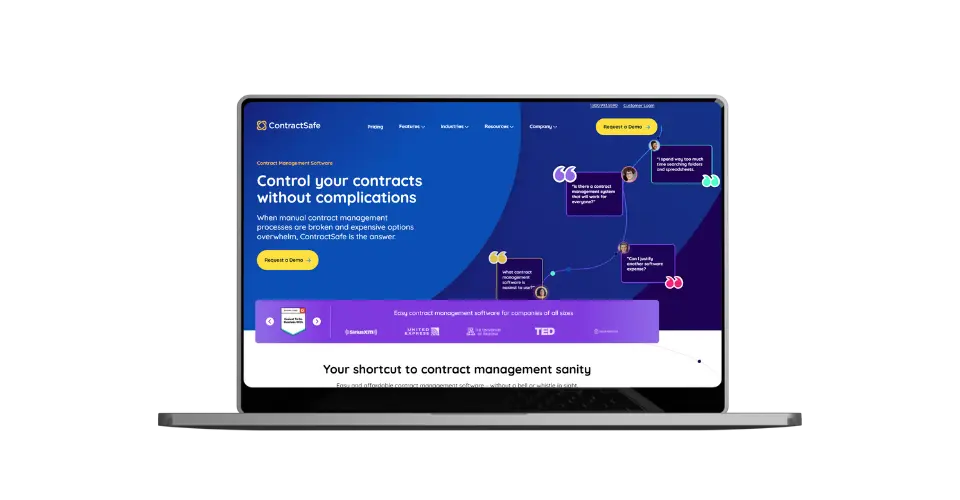
Type: Contract Management Software
Key Features: OCR, AI-driven automation, role-based access
HIPAA Compliance: SOC 2 certified, HIPAA-compliant
Pricing: Custom pricing
Best For: Healthcare teams needing an easy-to-use solution for contract management.
ContractSafe offers a user-friendly option for healthcare organizations needing secure contract management. While it’s not a proposal creation tool, it integrates with eSignature platforms like DocuSign, ensuring HIPAA compliance.
DocuSign
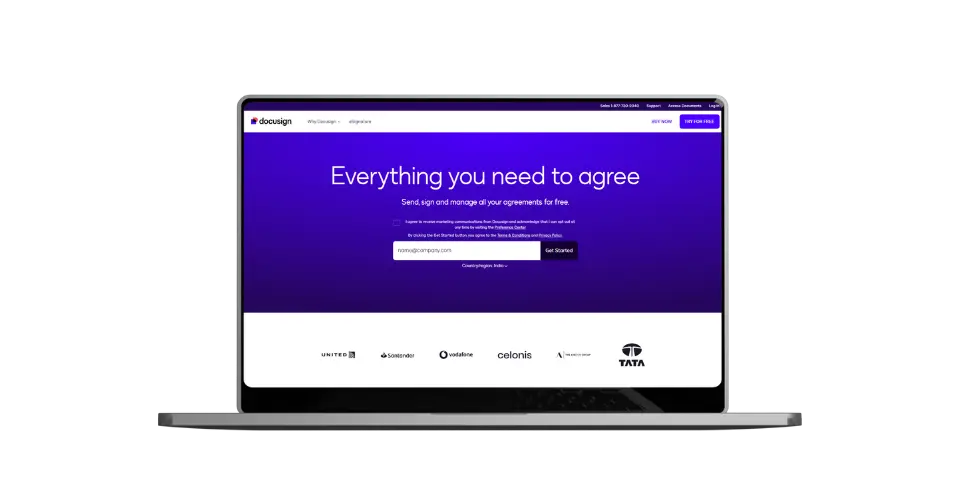
Type: eSignature & Document Management
Key Features: Secure eSignatures, document tracking
HIPAA Compliance: DocuSign provides a BAA to ensure full HIPAA compliance.
Pricing: Custom pricing
Best For: Businesses focused on secure eSignatures for their proposals and contracts.
DocuSign may not provide full proposal creation tools, but it’s an excellent choice for healthcare businesses that primarily need secure, compliant eSignatures and document management.
How to Choose the Right HIPAA Compliant Proposal Software
Here’s what to look for when evaluating proposal software:
- BAA Availability: Confirm that the vendor offers a BAA for PHI handling.
- Security Certifications: Look for certifications like SOC 2 Type II, ISO 27001, or other relevant security certifications.
- Encryption: Ensure the software uses AES-256 encryption for data protection.
- Access Controls: Check that the software offers role-based access to ensure only authorized personnel can access PHI.
- Audit Trails: Make sure the software provides detailed logs of document interactions.
- Integration Security: Ensure any integrations with healthcare systems maintain HIPAA compliance.
- Employee Training: Ensure that HIPAA training is available for your team.
What is an RFP in Healthcare?
A Request for Proposal (RFP) in healthcare is a formal document issued by a healthcare organization or contractor to solicit bids for services or products. These proposals can cover a variety of needs, from medical equipment and services to IT solutions and software systems. RFPs ensure that potential vendors understand the scope of the project and can provide the necessary details to meet the healthcare provider’s specific needs.
Healthcare RFPs are unique because they often require specific information regarding compliance with HIPAA standards. Vendors must demonstrate how their solution will protect Protected Health Information (PHI) and adhere to all relevant regulations before they are considered.
The Financial Impact of HIPAA Violations in Proposal Processes
When it comes to healthcare compliance, the costs of a violation go beyond fines, they can affect your reputation, customer trust, and overall business operations. Healthcare organizations must realize that failure to comply with HIPAA not only risks legal consequences but can lead to significant financial losses.
HIPAA violations can carry fines ranging from $100 to $50,000 per violation, with the maximum annual penalty reaching $1.5 million. That’s not to mention the potential legal fees, lawsuits, and reputational damage your organization could face. For healthcare organizations, the risk is simply not worth taking, especially when HIPAA-compliant software is readily available.
Future Trends in HIPAA-Compliant Proposal Software
As healthcare continues to embrace digital transformation, HIPAA-compliant proposal software is evolving to meet new demands. Here are a few trends to watch for:
- AI Integration: The integration of artificial intelligence (AI) will enhance compliance by automatically checking for violations and flagging potential issues in real time.
- Cloud Solutions: Cloud-based proposal software is becoming more common, providing scalability and flexibility while maintaining HIPAA compliance. These solutions offer better data security and easier integration with other healthcare systems.
- Automated Compliance: Expect more software to integrate automated compliance checks, making it easier for businesses to ensure they’re meeting HIPAA standards without manual oversight.
Staying Compliant, Streamlining Proposals
Choosing the right HIPAA-compliant proposal software is more than just about streamlining your workflow. It’s about ensuring that your business is doing the right thing by protecting the sensitive information entrusted to you. By selecting a secure, compliant solution like PandaDoc, ContractLogix, or DocuSign, you can ensure that your proposals meet the highest standards of compliance while keeping your business running smoothly. Compliance isn’t something to take lightly, and with the right tools, you can rest assured that your data.. and your clients.. are in safe hands.
At Proposal.biz, we’re committed to helping businesses handle proposals with ease, especially in fields where compliance is a priority, like healthcare. Our platform is designed to make managing proposals straightforward, with features that focus on security and compliance without overcomplicating things. As we continue to develop and refine our software, our goal is to give you a tool that not only meets your needs but helps you stay on track with the ever-evolving compliance requirements in a way that’s simple and secure.
